One Storm - Different Boats
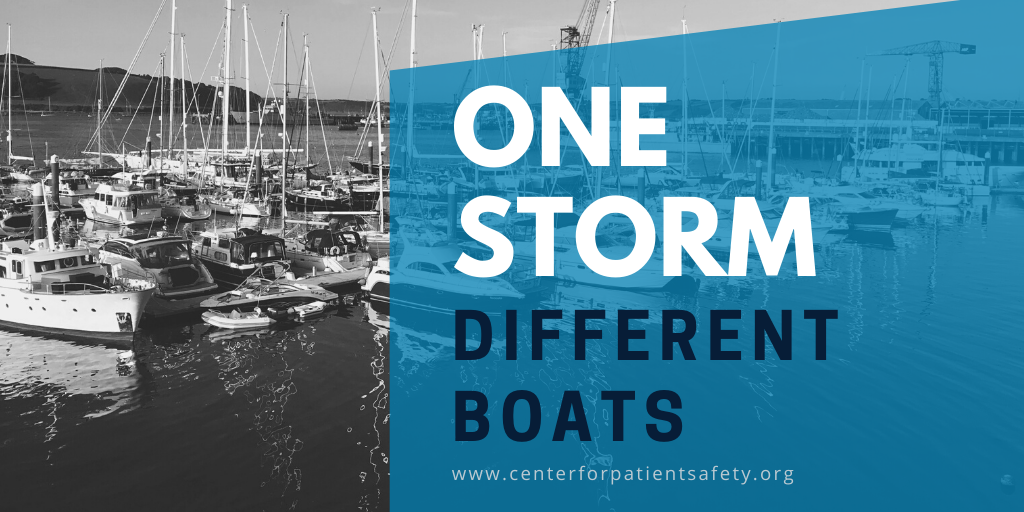
Recently, a friend of mine made a post on social media about our collective experience with the new coronavirus, disparaging the old adage that we are all in same boat. Instead, she suggested we are all in the same storm but in vastly different boats depending on where you live, what you do for a living, and a host of other circumstances. Taking a page from that thinking, I reached out to a handful of friends and colleagues to ask them the same set of questions about their experience with COVID-19. Their responses are interesting and instructive.
The Questions
These were the questions I posed:
- How has the coronavirus changed your daily practice of medicine as an EMS provider/leader?
- Provider safety has received a lot of focus during this outbreak (PPE, fatigue, mental health, etc.). When thinking about the safety of patients in your charge, what keeps you up at night during this pandemic?
- If you could look into a crystal ball, how does COVID-19 change the practice of paramedicine 1 – 3 – 5 years from now?
The Responses
Check out the following responses from Jonathon Washko, Hilary Gates, Peter Antevy, Pat Songer, James Chebra, and Kelly O'Connor-Nagel.
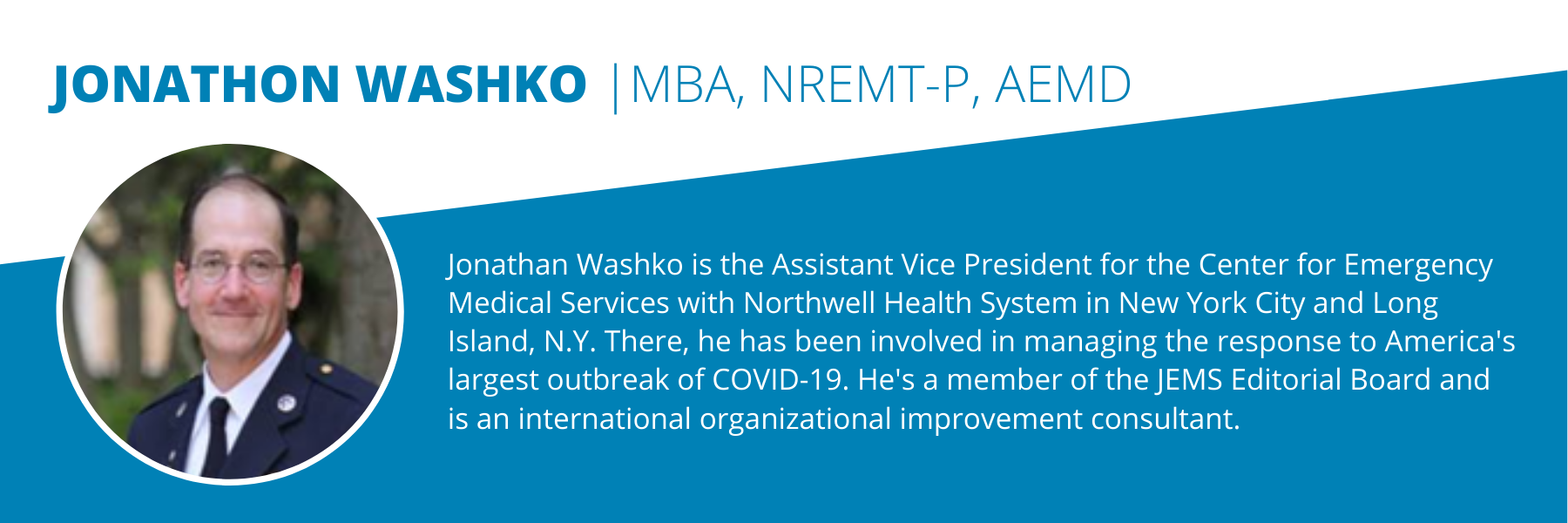
- It has me thinking about the long game and sustainability. Looking for innovative ways to repurpose our infrastructure and resources in a way that brings benefit to our stakeholders and sustainability to us. A great example of this is that we launched 911 direct to telemedicine visits within our marketplace within two weeks of the pandemic's start.
- Provider and patient safety are the top priority in that order. It has to be this way because if our providers get sick we cannot perform our mission. We were hyper-aggressive on provider safety in our operations. We were the first to go onto mask mandates for our entire organization: field, 911 center, billing center, etc. as well as mandatory EIDS and temperature screenings.
- It will fundamentally shake how healthcare is delivered going forward. We are seeing decades of change happen right before our eyes. Mobile healthcare, telemedicine, telehealth, community paramedicine, treat in place, alternative destinations, R.N. care navigation are going to be permanent parts of the post-COVID landscape. We are doubling down on our efforts in this space. The tenets of the EMS Agenda 2050 was 30 years away, now it feels rather close to possible in my lifetime."
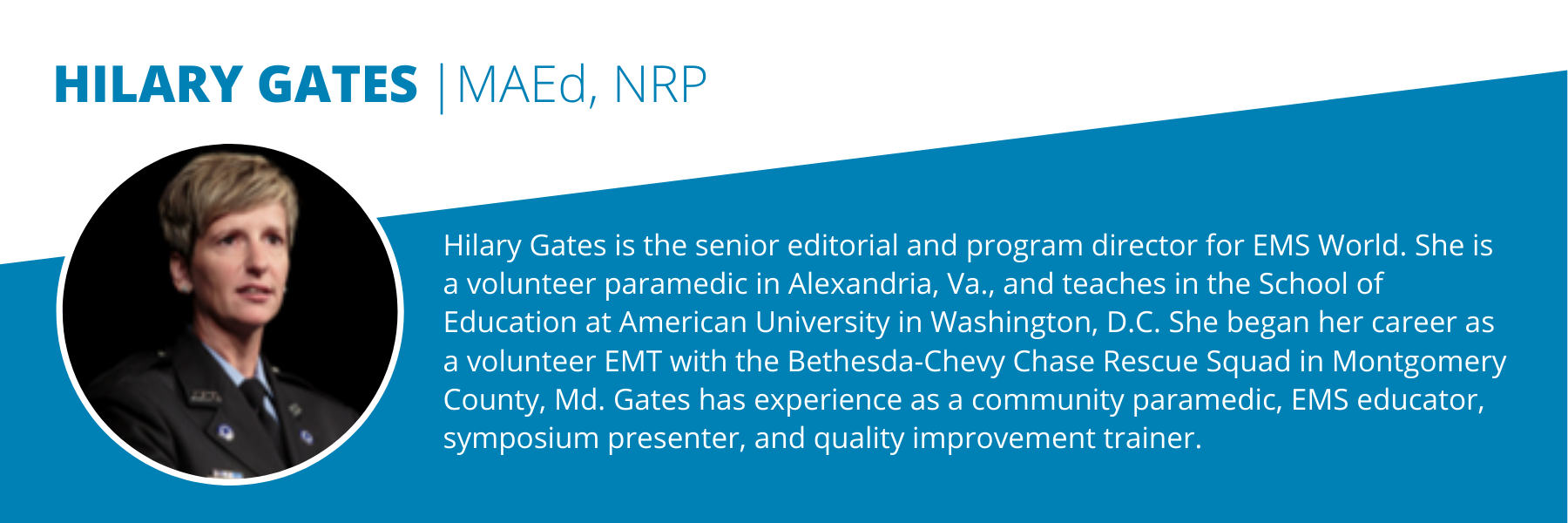
- The amount of information and the demand for accurate information is like nothing I've ever seen before. This is our time to shine as journalists and educators. Never have I felt before this urgency of breaking important news out of the (relative) comfort of my own home. Our EMS industry partners have risen to the challenge of the pandemic, and we are thrilled to have their support and guidance during this time. The EMS World editorial team has pivoted to focus its efforts on COVID-19 and bring to light the stories of our EMS brothers and sisters. It means long hours and late nights, but isn't this the case for everyone right now? While my agency now has put a hold on volunteers and ride-alongs, I ache for my colleagues who are facing the realities of the pandemic on the frontlines. I can only hope that supporting them with quality journalism and up-to-date information can serve as a replacement for the big hug I'd really like to give them.
- What feeds fear is the unknown; and our patients are likely overwhelmed by the mixed media messages, ever-changing clinical best practices, and confusing suggestions of medical and social advice. They are terrified, and EMS providers have to step up to the plate to try and give them some comfort. But how easy is it to comfort someone when you don't have all the answers, you are scared about your own health and that of your family? And when the traditional methods of providing care, interventions, and assessments are all turned on their heads. It is an awesome responsibility to give to a healthcare provider: keep it together for your own sake and then also be there 100% for your patients. And we cannot even bring them comfort right now by holding their hand.
- The changes that have occurred over the past two months in the delivery of healthcare, especially in EMS, have never been seen before in the history of our profession. Does that mean the changes will endure? Certainly, the Pollyanna view would be that the realization of the IHI Triple Aim has finally come to pass and will remain: the right care for the right patient at the right time and price. Telehealth, alternative destinations, nurse triage lines in the PSAPs: all of these could lead to improved patient outcomes. Oh, and maybe EMS continues to get reimbursed financially for these efforts… I do hope that the crystal ball shows the world the logic of these innovations."
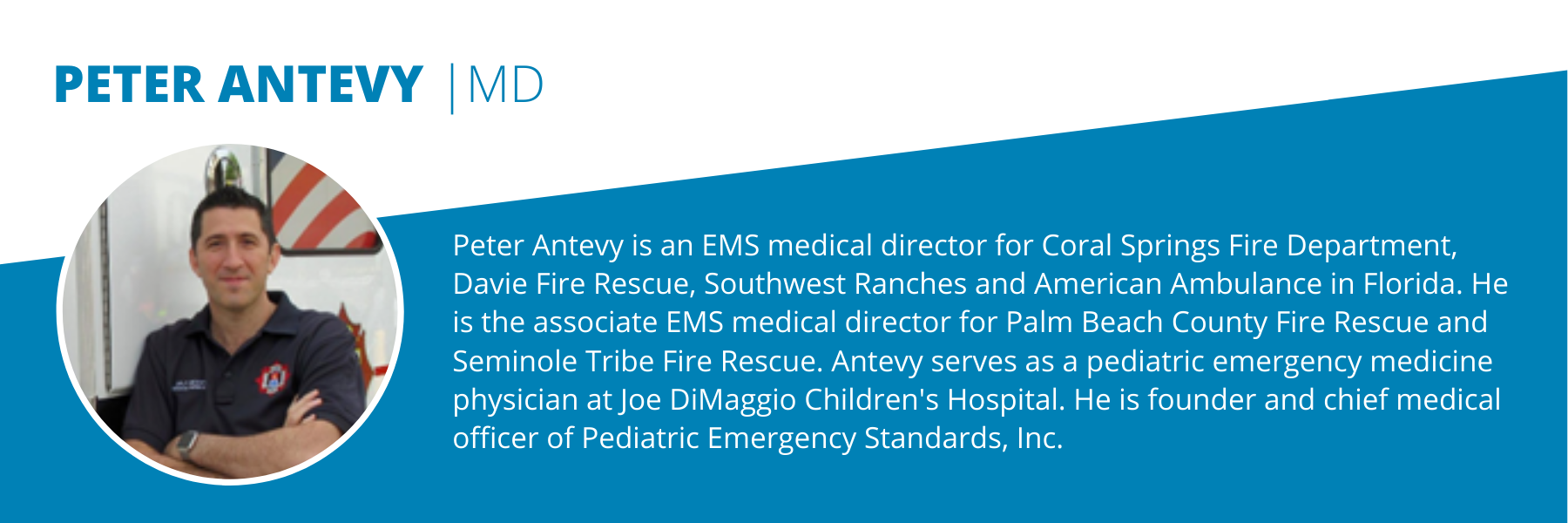
- Coronavirus has changed my daily practice as a medical director in so many ways, but mostly it has eliminated the face-to-face interaction that I enjoy so much. We have moved to Zoom meetings and tons of phone calls and emails. We have also begun using telehealth with patients, which allows me to assist with refusals and limiting the number of patients that have to be transported. I have been busier than ever creating new policies and protocols while keeping up to speed on the seemingly ever-changing recommendations during the crisis.
- I am concerned that my patients are not calling 911 or going to the ED POV due to their fear of contracting the virus. Numerous patients have expressed their fear to me, and we've seen a significant reduction in EMS and in the E.D. for things such as chest pain. Some cities have seen a rise in cardiac arrests and this is concerning to me.
- COVID-19 will change the way we interact with patients until a vaccine has been developed. Until then the use of masks and gloves will be ubiquitous to prevent our personnel from contracting the disease and bringing it home to their families. I also think it will help us ramp up the use of telemedicine and incorporate more policies that allow treatment at home. Lastly, this crisis will help us be better prepared for the next pandemic with respect to policies and procedures, and it will force us to have the necessary equipment ready before it's too late.
Comment: I've been proud of how nimble my systems have been and the biggest thing we did to encourage that was to create a number of WhatsApp groups that have been joined by hundreds of stakeholders from the city, the county and across the state. It has allowed us to react quickly, help each other out, and most importantly learn from each other. I have fostered so many new relationships with people within my community and that has been the biggest blessing."
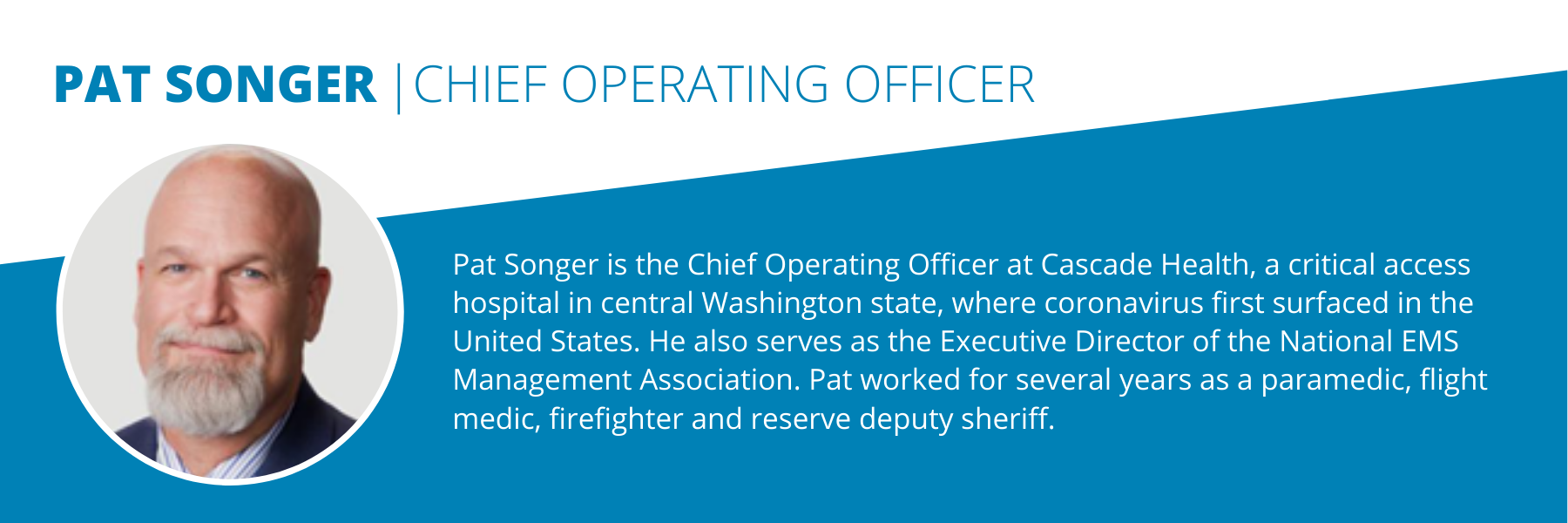
- Operations has shifted from providing patients with "standard" services to providing services around the safety and well-being of the patients we service in alternative environments, especially in the home.
- Workforce shortages, providers becoming ill, the need to create a sustainable local healthcare system in a new world of healthcare. Healthcare as we know it will never be the same, and we must adapt our practice in the new world if we are going to exist as small healthcare system.
- We must create work plans to address the need to service our patients at home. Paramedicine could be the key, but we must understand that to be an effective healthcare system, pre-hospital care has to evolve as part of "HealthCare," just as the Emergency Department is a part of the healthcare system."
Comment: "Ambulance Services" have to become more agile moving forward; we no longer can base our business model around traditional transport for payment.
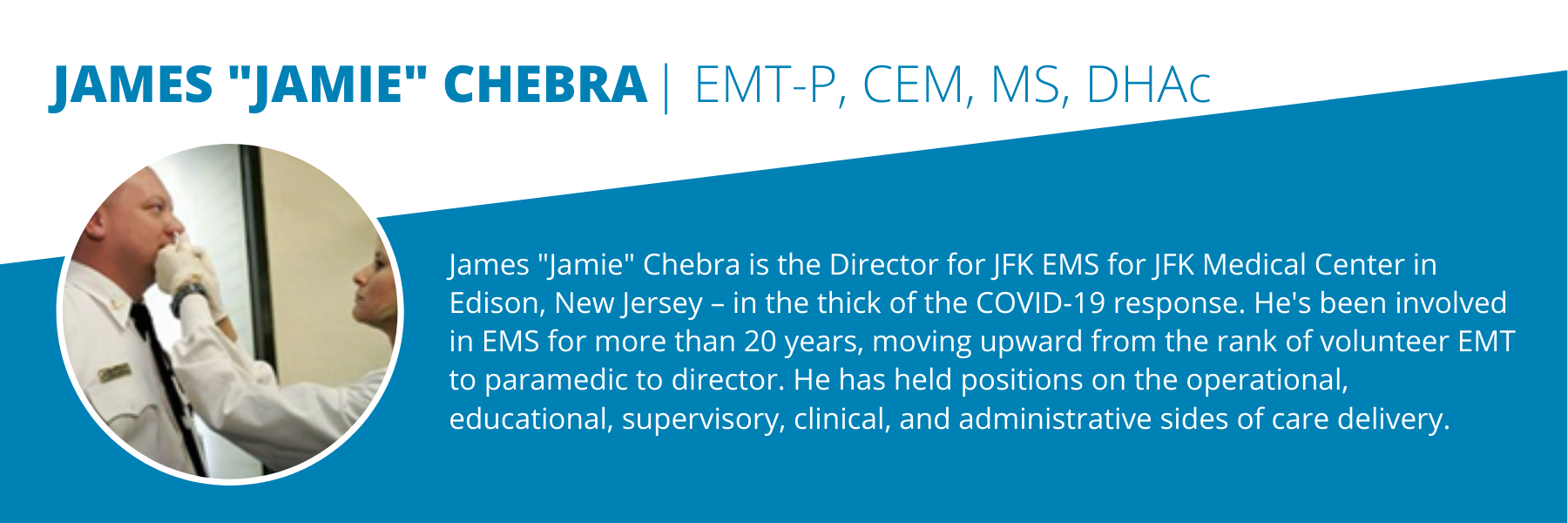
- The COVID-19 Pandemic has changed several things about my daily practice. In the weeks prior, my days were filled with meetings that left little opportunity to spend time with the crews. Once the pandemic came, meetings were cancelled, and leadership happened from the front. The role of a leader during this outbreak is dynamic: first responder, friend, therapist, logistics, to name a few. This pandemic was described by someone as a multi-day MCI; the difference is that this event puts our people and their families in harm's way. This event has shown me the best and the worst of humanity, selfishness to selflessness. To pick the one thing that has changed in my day-to day-leadership: the change in the leadership position. Typically, I try to lead from the middle, allow front-line leaders to excel and work to the top of their abilities. During this pandemic, the only way to lead is from the front. The difference between people coming to work and not coming to work, in their words, is that they could not let their teams down. Right now, leading is being out in front with the frontline heroes during the day, at night, weekends, and holidays.
- Patients have presented with their Sp02 values in the 60-70 percentage range on initial assessment, with a chief complaint of flu like symptoms that go into cardiac arrest (asystole). People are being told to shelter in place and stay home, that hospitals are not warranted. In many cases, the hospital is warranted. We have done an extremely high number of field pronouncements over the last weeks. I worry that the people we can help are unaware of how this virus operates and when to call 911.
- I think that this pandemic will change the EMS scope to include more point-of-care testing, I believe that EMT and paramedic curriculums will have a stronger focus on PPE and the provision of skills in PPE. I think that primary care medicine will further integrate EMS into education and practice. I would hope that EMS gets the respect it deserves for its part in the response to this coronavirus, and the providers get the recognition and benefits they deserve.
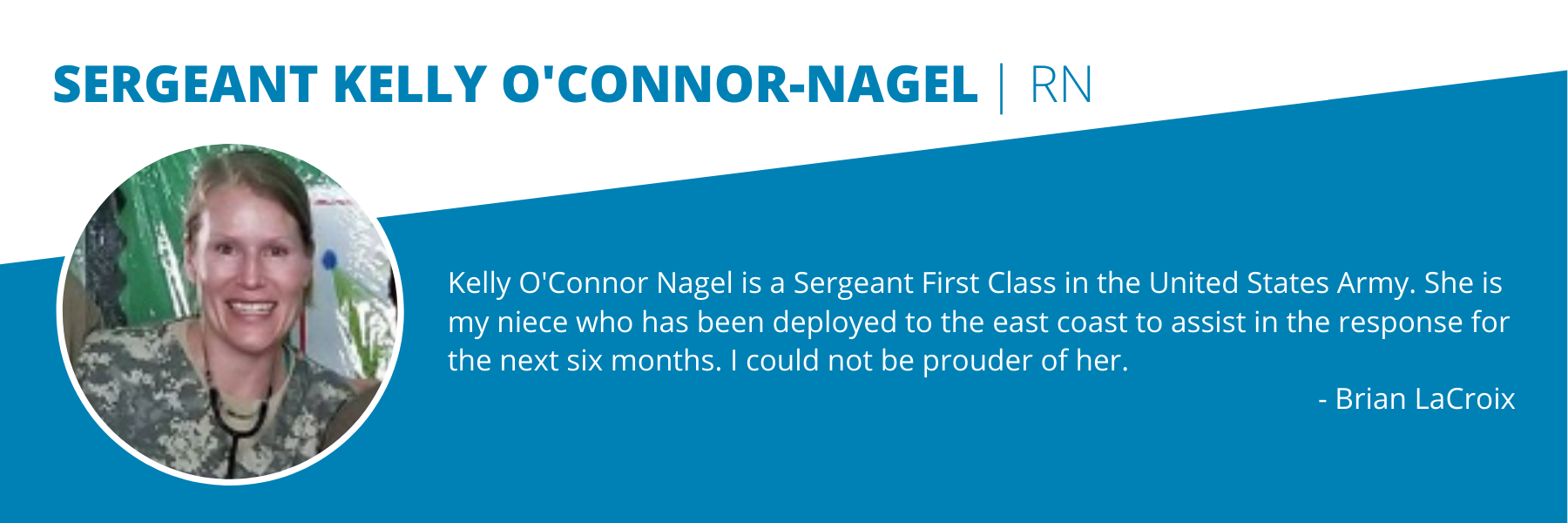
Kelly's Comments: Things have been busy since we arrived and set up a Field Medical Station at a convention center. It has been hectic with all COVID-19 patients and every day something new to figure out and trouble-shoot, but we are starting to get into a groove. The Department of Health is who we are here to support, and they started bringing in civilian staff--that has freed up some of our military nurses and doctors that we just started to send out into the community to help at hospitals. This place (sic) is such a busy hospital and they have so many extremely sick patients; many are on ventilators. In some cases they have converted many areas of the hospital into overflow ICUs. Things are changing daily, and we are adjusting. Busy days -- but it is good. I have a wonderful commander and a lot of other great soldiers with whom I work. I am lucky to be a part of such a strong, caring team; and hopefully, we are helping the country deal with this by doing what we can. I’m beyond grateful for my friends and family's support.
In Conclusion
So many boats – attempting to find their way through this pandemic and emerge better for it on the other side. Calm seas don't make for a skilled mariner. Be well!
.png)